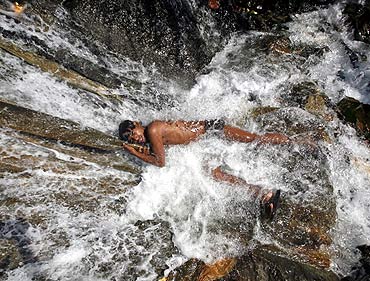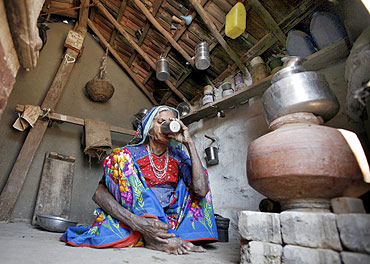Photographs: Reuters
India on Thursday came out strongly against a report on the presence of a drug resistant bacteria in the public water system of the capital, saying the motives behind it were not 'scientific' and the government will respond in an appropriate forum.
"Just to keep the heat on a country or a region, that is not scientific motive for a study," said Secretary of the Department of Health Research V M Katoch.
"Enough is enough. Scientifically, we will respond to it in an appropriate forum," said Katoch, who is also the director of the Indian Council of Medical research.
International medical journal Lancet had reported that deadly superbug NDM-1 was found in about a quarter of water samples taken from drinking supplies and puddles on the streets of New Delhi.
'NDM-I is not a significant problem in India'
Photographs: Reuters
Katoch said that the report was unsupported by any 'clinical and epidemiological' evidence and also does not highlight the 'unstable character of the isolates'.
Quoting from a study conducted by microbiologists of the Ganga Ram Hospital, Shashi Khare, deputy director of the National Centre for Disease Control, said that out of 1,944 pregnant women surveyed, none had any Carbapenem resistance, which should be present if a person is carrying NDM 1 bacteria.
The fact that patients respond well to medical and post-surgical antibiotic treatment indicates that NDM-I is not a significant problem in the country, he said.
Taking on the report further, Katoch said that the carbapenem antibiotic is not required to be used in the treatment of Cholera and Shigella dysentery, as stated by the study as these cases respond to commonly used antibiotics.
Delhi Jal Board dismisses report
Photographs: Reuters
"The publication itself mentions that NDM-I gene is not a stable character in most of the isolates, indicating that any time it can revert back to a sensitive state," Katoch said.
He added that transferring biological material out of the country for the purposes of any study without taking permission from the government was not legal. However, he could not elaborate on what steps could be taken against such action.
Meanwhile, the Delhi Jal Board dispelled concerns following reports about the presence of drug-resistant bacteria in the capital's tap water. The board said the water being supplied by the agency was 'safe' for drinking.
Delhi water is safe for drinking
Photographs: Reuters
"We want to assure everyone that Delhi water is safe for drinking," DJB CEO Ramesh Negi told reporters and claimed that the water supplied by the agency conforms to the standards prescribed by the Bureau of Indian Standards.
Both the NDM-1 positive samples were from Ramesh Nagar, west of the Yamuna River, "but the report itself states that the strain cannot grow in tap water as it is chlorinated," Negi said.
When asked about reports of the presence of drug-resistant bacteria in the city's water, Chief Minister Sheila Dikshit said she has sought detailed reports about it from the DJB and the Health Department.
"It (drug-resistant bacteria) has been found in water in some areas around the Red Fort. I have sought detailed reports about it," she said.
'Superbug' can be treated with antibiotics
Photographs: Reuters
Experts say it is the latest proof that the new drug-resistant bacteria, named after New Delhi, is widely circulating in the environment and could potentially spread to the rest of the world.
The 'superbug' can only be treated with a couple of highly toxic and expensive antibiotics. Since it was first identified in 2008, it has popped up in a number of countries, including the United States, Australia, Britain, Canada and Sweden.
Most of those infections were diagnosed among people who had recently traveled to or undergone medical procedures in India, Pakistan or Bangladesh.
India had earlier protested against the naming of the bug after its capital, saying the research was not supported by scientific data.
Director General of Health Services R K Srivastava said that that following the publication of the report in August last year, the government had written to the editor of the Lancet, asking him to publish a letter refuting the theory, but the magazine had refused to publish it.






article